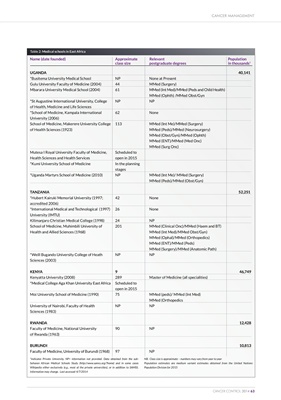
CANCER MANAGEMENT
64 CANCER CONTROL 2014
are outside the university system and function in a similar
way to those that have long existed in more developed
countries would be necessary to put this approach onto a
formal footing. The primary focus would be "competencebased" i.e., education, training
and knowledge assessment
strongly focused on clinical care. Such institutions would
require government approval and independent accreditation,
but could be entirely separate from the government. Their
responsibility would be ensuring that health care providers
beyond the primary level are appropriately qualified, have
access to continuing education, adhere to the professional
standards set and are accountable for their actions. They
would not provide treatment, although they could well act as
conveners for committees and assume responsibility for
developing national referral guidelines, patient "care-paths"
and standardized treatment regimens. The limiting factor in
the establishment of such bodies is the small size of the
oncological community in countries with limited resources.
This might be overcome by creating international
organizations of this type, such as the recently inaugurated
Hematology and Oncology Society of Africa (HOSA).10
International organizations would have the added potential
to create standards of care and curricula for trainees, as well
as the provision of examiners across many African nations.
University training lasting one to three years can seriously
deplete the already insufficient number of health
professionals in countries where most or all post-graduate
training is conducted in universities and the contribution of
trainees to patient care is small. In addition, a limited number
of university places as well as specialist training programmes
exist at each university (Table 2), which may lead to
unbalanced capacity building. The extreme shortage of
oncologists in regions such as East Africa could be addressed
by very short periods of training for doctors, or even medical
assistants, in the diagnosis or management of a single type of
a common cancer. Clinical training and procedures, e.g.,
spinal taps and bone marrow exams would be done "at the
bedside." Trainees would be exposed to the cancers more
frequently in their own country and learn to practise in a
resource-limited environment rather than in the relatively
luxurious settings of foreign institutions, or the artificial
environment of the classroom neither of which prepare them
for the devastating realities of limited or absent resources.
In a non-university setting, training could be done in any
cancer centre or unit. Oncology sub-specialties, especially,
may be best taught in the course of supervised patient care in
cancer institutions. Alternative cancer specialist educational
pathways of this type would mean that more specialists could
be trained without a reduction in access to cancer care during
the training period. Training in a cancer centre would
encourage the simultaneous development of interdisciplinary teams, to ensure patient-focused care and relief
of workload pressure on the oncologist. Specialists would not
necessarily give up caring for patients with non-malignant
conditions, and surgeons, for example, might continue to see
other patients whilst undergoing training in surgical
procedures for cancer. Some task-shifting may be necessary
to enable physicians to focus on those aspects of care that
only they can undertake while nurses or medical assistants
with specialized training - again, of the "bedside" type -
would undertake the delivery of chemotherapy and perform
procedures e.g. spinal taps and even endoscopies normally
performed only by doctors. In the long run, the training and
employment of social workers disciplines involved with
rehabilitation and "trackers" who ascertain the status of
patients who have completed therapy should increase
efficiency as well as provide improved data on survival rates.
Certification
To ensure appropriate standards, a process for assessing
professional competence would need to be developed, ideally
involving external examiners and certification of those who
meet the requirements. The focus of university education
would rightfully become academic education and research.
Once certified, junior specialists (assistant or associate
oncologists?) could aspire to become "fully trained"
oncologists with a broader clinical knowledge base,
equipping them to undertake a leadership role in cancer
treatment. Associate oncologists practising outside the
specialist oncology centre could develop an interdisciplinary
oncology team across the tertiary-community interface.
Constant augmentation of knowledge could be assured by a
programme of continuing education (involving credits),
consisting primarily of inter-hospital clinico-pathological
case conferences or lectures/discussions on issues of care. If
accepted as an alternative to a post-graduate university
degree, all hospitals with a trained oncologist could be
involved in teaching, as well as service provision, thereby
overcoming some of the obstacles that currently exist.
Root problems in the development of higher
education
In East Africa, approximately 50% of the population is less
than 15 years of age. This has an impact on both the economy
and education, since productivity and government income in
the form of taxes are both low and the need for teachers at all
levels is high. In the last decade, improvements in the number
of children completing primary education (although still